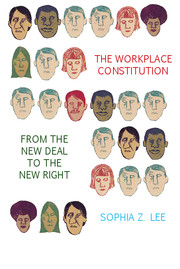
The Regulatory Review features commentators on a new book that analyzes the campaign to give constitutional rights to workers.
Work is a major part of life for most adults. But millions of Americans with private sector jobs possess no constitutional protections in their place of work.
 In a new book, The Workplace Constitution from the New Deal to the New Right, Penn Law Professor Sophia Z. Lee analyzes the long but ultimately unsuccessful struggle to give constitutional rights to workers in private firms. Lee highlights the history of two movements focused on expanding constitutional rights in the workplace – the civil rights movement and the right-to-work movement.
In a new book, The Workplace Constitution from the New Deal to the New Right, Penn Law Professor Sophia Z. Lee analyzes the long but ultimately unsuccessful struggle to give constitutional rights to workers in private firms. Lee highlights the history of two movements focused on expanding constitutional rights in the workplace – the civil rights movement and the right-to-work movement.
Both movements shared the ultimate goal of constitutional protections in the workplace, but among other things key differences between these unlikely liberal and conservative partners gave way to their eventual failure. The divide was most pronounced with respect to unions – the civil rights movement sought worker protection through the stability provided by unions, whereas right-to-work supporters saw unions as an unnecessary restriction on workers’ liberty. Lee illustrates how the groups’ discordant methods “sapped support for the workplace Constitution and ultimately led to its collapse.”
The Workplace Constitution also examines the role of administrative agencies in offering workplace protections. Lee uncovers a striking series of historical actions by agencies to interpret the constitution on their own accord to protect the rights of workers, even in the absence of a judicial support.
In this series, The Regulatory Review features six essays reviewing The Workplace Constitution. Each essay showcases a different scholar’s analysis of Lee’s new contribution to the fields of employment discrimination, constitutional, administrative, and labor law. We begin with an essay by Professor Lee, introducing the series and highlighting some of her book’s major themes.
Administering the Workplace Constitution
March 30, 2015 | Sophia Z. Lee
Most Americans lack constitutional rights at work. Instead of enjoying free speech or privacy, employers can fire them for almost any reason or no reason at all. This outcome was far from inevitable.
A Window into America’s Administrative State
March 31, 2015 | Gillian Metzger
Sophia Lee’s The Workplace Constitution: From the New Deal to the New Right offers a remarkable window on the federal administrative state
Administrative Constitutionalism and Administrative Power
April 1, 2015 | Nicholas Parrillo
Lee unearths and analyzes a wealth of important material on what can happen when an agency seeks to enforce the constitution. What does her material suggest about whether bureaucratic enforcement of the constitution is desirable and practically sustainable?
A Contribution to Both Legal History and Constitutional Theory
April 2, 2015 | Mark Tushnet
Lee’s juxtaposition of African-American’s efforts to secure constitutional rights in the workplace to the development of conservative right-to-work efforts to do “the same” shows that the Constitution has no particular political valence.
Appreciating The Workplace Constitution
April 3, 2015 | Deborah Malamud
Lee’s book has challenged my assumptions about labor law, employment discrimination, constitutional law, and administrative law.
The Workplace Constitution and the Spiderman Theory of State Action
August 31, 2015 | Seth Kreimer
Professor Lee’s book exhibits a full array of the virtues of the historian, the legal scholar, and the writer. The Workplace Constitution is packed with acute and nuanced accounts of legal moves and counter-moves, arresting portraits of crucial actors, telling details, and elegant writing.



